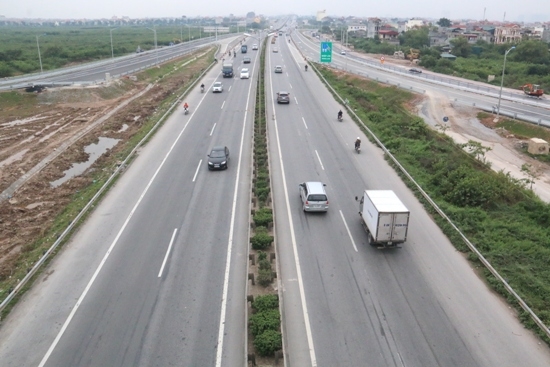 Society
Society

The completion of the North-South highways is not only a prerequisite for the construction of other highways throughout the country, but is also necessary to realise the target of building at least 2,000km of highways by 2020.
 |
| The completion of the North-South highways is not only a prerequisite for the construction of other highways throughout the country, but is also necessary to realise the target of building at least 2,000km of highways by 2020. — Photo mt.gov.vn |
HÀ NỘI — The completion of the North-South highways is not only a prerequisite for the construction of other highways throughout the country, but is also necessary to realise the target of building at least 2,000km of highways by 2020.
Deputy Prime Minister Trịnh Đình Dũng made the comment at a meeting to review the project in Hà Nội on Thursday.
The construction of the highways was necessary and could not be delayed, Dũng said, stressing that it would support national development and the economy’s competitiveness.
Although expanded transport infrastructure over the past years had helped fuel economic growth and raise people’s living conditions, it still failed to meet the demands of industrialisation and modernisation, he pointed out.
Dũng requested the eastern route of the North–South Highway, running parallel to National Road 1, be completed in 2020 at the latest.
The eastern highway, with a length of 1,814km, will run from Pháp Vân Road in Hà Nội to the Mekong Delta city of Cần Thơ. Meanwhile the western section will follow the direction of the Hồ Chí Minh Highway.
Speaking at the meeting, Minister of Transport Trương Quang Nghĩa said that several sections of the eastern facility had been put into use such as the Pháp Vân-Cầu Giẽ-Ninh Bình section with a total length of 171 kilometres.
Another 302 kilometres were under construction like the sections of La Sơn–Túy Loan and Đà Nẵng–Quảng Ngãi in the Central region, and Bến Lức–Long Thành and Trung Lương–Mỹ Thuận in the south, Nghĩa said.
According to the Ministry of Transport, the completion of the easterly North-South Highway requires an investment of VNĐ236 trillion (nearly US$10.5 billion). Of that, the capital mobilised from investors is estimated at over VNĐ116.4 trillion (over $5.1 billion), accounting for 49.34 per cent of the total investment. The other sources are more than VNĐ75.3 trillion ($3.35 billion) from Government bonds for 2016-2020 and more than VNĐ44.1 trillion (nearly $2 billion) from official development assistance.
Deputy PM Dũng asked for attracting private funding for the construction of the highways, which was suggested to use the public–private partnership model, noting that private capital must be higher than that from the State budget.
He told the ministries of transport and finance to devise State capital allocation mechanisms for the project, and ensure reasonable road tolls and toll collection duration, so as to solicit investors from Việt Nam and other countries.
They also have to work with the ministries of planning and investment, construction, and natural resources and environment to work out a detailed blueprint for developing expressways, especially the eastern North–South one, the official added. — VNS




